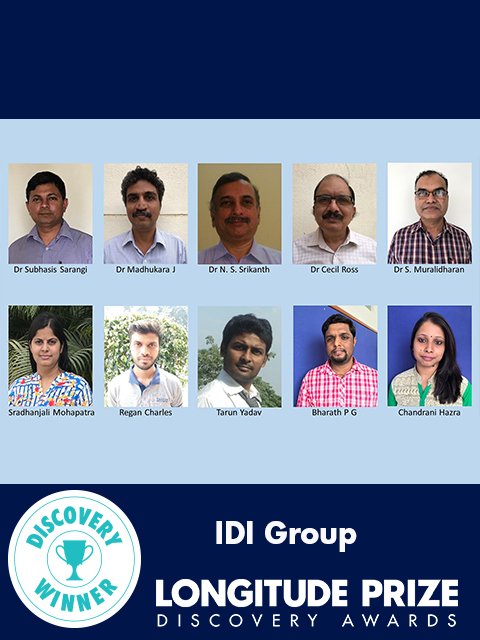This team successfully won a Discovery Award seed-funding grant to help further develop their ideas for their Longitude Prize application and create a diagnostic test that helps solve the problem of global antibiotic resistance. Below we have asked them to explain their test and motivation for applying.
Please explain your test.
Blood stream infection or sepsis is a life-threatening condition that arises when the body’s response to infection causes injury to its own tissues and organs. The initial treatment with empirical broad-spectrum antibiotics not only is inadequate, but also promotes antibiotic resistance. The present gold standard, bacterial blood cultures and susceptibility testing, requires days to obtain a result. The extremely high mortality of sepsis and antibiotic resistance is partly due to the inability to rapidly detect and identify bacteria in the early stages of infection. We are developing an affordable diagnostic platform technology to rapidly detect and identify bacteria in blood.
Please share a more detailed description of this work from a medical professional’s perspective.
We are developing a cost effective ultrasensitive magnetic biosensor to rapidly detect and identify bacteria in blood, which would help treating sepsis during its early stage, before it becomes more dangerous. Our technology is based on tunnel magnetoresistance (TMR) based ultrasensitive magnetic biosensors. The ultrasensitive magnetic biosensors can detect bacteria selectively from unprocessed blood with a detection limit of 1 cfu/ml without culture and amplification reaction. The principle of this technology is based on selective isolation of the bacterial pathogens among millions of other blood cells (RBC, WBC and platelets) using antibody-functionalized polymer-coated superparamagnetic nanoparticles, which are employed to bind to the bacteria specifically and confirming the microbial infection using TMR biosensors. The rapid identification and separation of bacteria from blood would facilitate their genetic identification by DNA microarray, PCR, or other methods so that a proper antibiotic regimen can quickly be selected for the septic patient.
Why did you apply and what will the Discovery Award funding be used for in your work?
We are developing a cost effective ultrasensitive magnetic biosensor to rapidly detect and identify bacteria in blood, which would help treating sepsis during its early stage, before it becomes more dangerous. Our technology is based on tunnel magnetoresistance (TMR) based ultrasensitive magnetic biosensors. The ultrasensitive magnetic biosensors can detect bacteria selectively from unprocessed blood with a detection limit of 1 cfu/ml without culture and amplification reaction. The principle of this technology is based on selective isolation of the bacterial pathogens among millions of other blood cells (RBC, WBC and platelets) using antibody-functionalized polymer-coated superparamagnetic nanoparticles, which are employed to bind to the bacteria specifically and confirming the microbial infection using TMR biosensors. The rapid identification and separation of bacteria from blood would facilitate their genetic identification by DNA microarray, PCR, or other methods so that a proper antibiotic regimen can quickly be selected for the septic patient.
What difference will your work make in the long term with regards to antimicrobial diagnostics?
Early diagnosis of infectious diseases is key to curbing antimicrobial resistance. Our device gives information about the gram-status of infection within a couple of hours of its onset. In other words, it enables a clinician to prescribe a narrow spectrum antibiotic instead of a broad spectrum one.
If there is a design for a prototype, please describe it and how it will work.
Our work will directly lead to a rapid, sensitive and specific test to detect and identify bacterial infection in blood. The test will enable healthcare providers to prescribe an effective treatment of sepsis and reduce the volume of antibiotics prescribed, which would slow the spread of resistance.
Who is on your team?
Dr Subhasis Sarangi Dr Madhukara J Dr N. S. Srikanth Dr Cecil Ross Dr S. Muralidharan Ms Sradhanjali Mohapatra Mr Regan Charles Mr Tarun Yadav Mr Bharath P G Ms Chandrani Hazra

